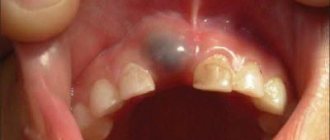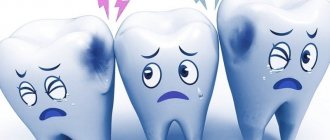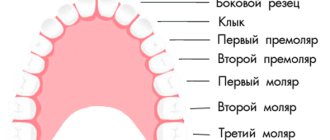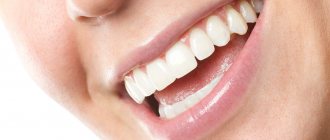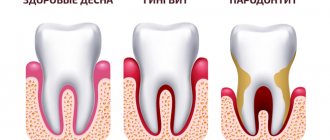Author of the article:
Soldatova Lyudmila Nikolaevna
Candidate of Medical Sciences, Professor of the Department of Clinical Dentistry of the St. Petersburg Medical and Social Institute, Chief Physician of the Alfa-Dent Dental Clinic, St. Petersburg
Placing a crown on a tooth is a very common procedure. However, we often hear complaints that after it the patient’s gums under the crown become inflamed. Let's try to answer the question, why does this happen?
Why does the gum under the crown hurt? Causes of pain.
The dentist will be able to determine exactly what case you have, and only he will be able to prescribe the most effective treatment.
Common problems:
- The crown is directly adjacent to the gums, so it is not surprising that irritation may occur between the gum and the foreign body. In addition, very often small particles of food get stuck in the space between the gum and the crown.
- Another reason for gum swelling and tissue inflammation may be that it is time to replace your crown - remember that they do not last forever and have a certain service life.
- Also, if the gums under the crown hurt, the tooth may be to blame. In any case, inflammation of the gums under the crown indicates a problem that only a dentist can fix.
- Crown injury. To ensure that the artificial structure is securely fixed and does not put pressure on the gingival margin, the orthopedist creates a small “step”. But sometimes this fails. In such cases, the crown begins to put pressure on the soft tissue, which disrupts the blood circulation process.
- In addition, if the edges of the crown overhang, they gradually rub the gums, causing microtrauma and compromising the integrity of the mucous membrane. Because of this, the soft tissues begin to become inflamed.
- Poor preparation for crown installation
- The most common cause of complications is poor preparation for surgery. It includes poor quality work and doctor errors. The most common ones include:
- Damage to the gums during grinding of dental tissues to install a crown. A diamond drill can touch soft tissues, leaving small damage on them, which in the future can become foci of inflammation.
- Poor quality of root canal filling.
- Perforation of the canal during fixation of the structure or during processing of the pin, which can also lead to gum inflammation.
- In rare cases, it happens that the gums under the crown are swollen due to a piece of instrument getting into the root canal. Of course, such situations, indicating the negligence of doctors, are rare, but this cause of inflammation of the gums near the crown should not be excluded.
What complications can there be?
In the absence of timely treatment, the disease can lead to complications:
- An abscess is a purulent inflammation of tissue (if there was no pus during inflammation before).
- Phlegmon is an acute purulent inflammation of the subcutaneous tissue and connective tissue.
- Osteomyelitis is a purulent-necrotic process that develops in the bone and surrounding soft tissues.
- Periodontitis is inflammation of the periodontium, i.e. all tissues adjacent to the tooth.
In particularly severe cases, blood poisoning may occur (for example, if an abscess breaks).
Abscess is one of the possible complications
Signs of inflammation
You need to pay special attention to the following symptoms:
- Pain. Most often, its cause is inflammation of the soft tissue under the crown or irritation of the root canals.
- Edema. This is a signal that inflammation has begun.
- A fistula is a channel from which pus comes out; it may appear some time after swelling.
It is worth remembering that after prosthetics, the first two to three days may be uncomfortable. In this case, you do not need to take any additional measures; if pain interferes with the usual course of business, take pain medications.
Symptoms
It is not difficult to determine the presence of a pathological process, since the inflammatory process has pronounced symptoms. The patient is concerned about the following signs:
|
Important! If the above symptoms appear, you should immediately visit a doctor. Otherwise, more dangerous complications may occur.
How to relieve pain
However, it is possible to relieve the painful symptoms of swollen gums under the crown using folk remedies:
- Mix a tablespoon of chopped thyme, chamomile and yarrow. Pour 200 ml of boiling water and let it brew for half an hour. Wait for the mixture to cool to room temperature and use as a rinse three times a day.
- The oak bark is simmered over low heat under a closed lid for 20-30 minutes. An infusion of sage leaves is added to the resulting decoction. A warm decoction will have a beneficial antiseptic and anti-inflammatory effect.
Of course, if the gum under the crown is inflamed, these methods can only relieve the pain momentarily, but they will not eliminate the cause of the disease, so you will still have to see a doctor.
What will the dentist do if the gums become inflamed after installing a crown?
First of all, the doctor will order an X-ray to determine the cause of inflammation of the gums under the crown. Treatment by the dentist will also be selected based on this information.
Most often in these cases it is necessary to remove the crown. Additionally, patients are prescribed anti-inflammatory treatment and antibiotics. It is possible to re-prosthetize a tooth after the gums have become inflamed only when the anti-inflammatory treatment has ended. And only then will a new crown be installed.
It is important to understand that folk remedies will not be effective in this case and will not replace seeing a doctor. If you realize that discomfort continues for more than three days, be sure to consult a doctor. Inflammation is a serious process that affects the body as a whole, so it is important to recognize the cause as early as possible and determine effective treatments for inflammation.
Treatment options
Depending on what triggered the pathological process, the doctor may recommend various methods of therapy:
In addition to the above solutions, for the treatment of gums, the doctor may prescribe various medications: anti-inflammatory, antibacterial, antihistamines, etc. The drugs can be intended for topical use or oral administration. |
To reduce discomfort before going to the dentist, you can use some tips:
- Rinse your mouth with a decoction or infusions based on medicinal plants: oak bark, chamomile, sage, etc.
- Take a painkiller, for example, Ketorol or Nise.
- Use ointments or gels for topical use with an analgesic effect.
Care
To avoid problems with structures, you should properly care for them. For teeth with crowns, you can use an irrigator and specialized solutions for it, for example, ASEPTA with extracts of medicinal herbs. This will ensure proper cleaning in hard-to-reach places and will be a good prevention of problems with crowns.
In addition, the specialized ASEPTA ACTIVE paste, made on the basis of natural herbs and special enzymes, will help you maintain a healthy state. It eliminates pathogenic bacteria, relieves gum inflammation and prevents bleeding, providing comprehensive protection to tooth enamel.
Daily use of ASEPTA mouth rinse will also help to avoid inflammation; it combines analgesic, anti-inflammatory and antimicrobial effects. It increases the effectiveness of periodontal treatment and prevents the development of many diseases.
Oral hygiene with removable prosthetics
At first, after installing the prosthesis, discomfort may occur. The gums need to adapt to the design. Typical problems in the first few days of using a new denture: impaired diction, pain and redness of the gums associated with rubbing. If you immediately begin to properly care for your gums and structures, these symptoms will go away.
Basic Rules:
- Wash your denture after every meal. Goal: remove food debris, prevent plaque formation and microbial attack. It is enough to rinse the structure with running water. If you use gels or other means for fixation, there is no need to remove the denture: just rinse your mouth thoroughly with clean water or a special rinse, for example, ASEPTA® Active.
- Clean the prosthesis once a day. It must be cleaned daily with a toothbrush and a special paste (you can use children's paste) with minimal abrasiveness. Under no circumstances should you use tooth powder or whitening pastes containing solid particles. Aggressive components scratch the surface of artificial teeth, as a result they become dirty faster and the service life of the prosthesis is reduced. You should choose a brush with soft bristles.
- Using special products for the prosthesis once a week. The most popular: effervescent tablets and ultrasound baths. The tablets quickly dissolve in water and contain special antiseptics and enzymes (substances that accelerate the action of antiseptics): just dip the prosthesis into the solution and after a few hours it will be completely cleared of bacterial plaque and, as a result, unpleasant odor. Ultrasonic baths help even faster than effervescent tablets: they easily destroy plaque even in hard-to-reach places.
- Professional cleaning once every six months. Done at the dentist.
It is important not only to wash and clean the structure, but also to store it properly at night. To do this, use plain water or special pharmaceutical solutions. When stored in a dry environment, the denture may become deformed, so it is important to soak it completely. The optimal liquid temperature is room temperature.
Important! Be sure to take proper care of the remaining teeth in your mouth. To do this, we use a separate brush with bristles selected according to the condition of the teeth (usually medium hardness) and a suitable toothpaste.
To fix dentures, doctors recommend using special powders, creams and gels. Firstly, they securely fasten the structure to the gums, and secondly, they prevent food particles from getting under the denture.
Clinical researches
ASEPTA® mouth rinses are designed to protect gums from inflammation and improve oral hygiene. The main indications for their use are:
- acute and chronic gingivitis;
- acute and chronic periodontitis;
- stomatitis;
- post-extraction alveolitis;
- toothache of infectious origin.
Clinical trials conducted in laboratories have shown that after 3 weeks of using ASEPTA® rinse, gum bleeding is reduced by 28.3%, inflammation is reduced by 32.3% and the hygienic condition of the oral cavity is improved by 33.5%*.
Sources:
- Clinical and laboratory assessment of the influence of domestic therapeutic and prophylactic toothpaste based on plant extracts on the condition of the oral cavity in patients with simple marginal gingivitis. Doctor of Medical Sciences, Professor Elovikova T.M.1, Candidate of Chemical Sciences, Associate Professor Ermishina E.Yu. 2, Doctor of Technical Sciences Associate Professor Belokonova N.A. 2 Department of Therapeutic Dentistry USMU1, Department of General Chemistry USMU2
- Clinical experience in using the Asepta series of products Fuchs Elena Ivanovna Assistant of the Department of Therapeutic and Pediatric Dentistry State Budgetary Educational Institution of Higher Professional Education Ryazan State Medical University named after Academician I.P. Pavlova of the Ministry of Health and Social Development of the Russian Federation (GBOU VPO RyazSMU Ministry of Health and Social Development of Russia)
- Report on clinical trials to determine/confirm the preventive properties of commercially produced personal oral hygiene products: mouth rinse "ASEPTA PARODONTAL" - Solution for irrigator." Doctor of Medical Sciences Professor, Honored Doctor of the Russian Federation, Head. Department of Preventive Dentistry S.B. Ulitovsky, doctor-researcher A.A. Leontiev First St. Petersburg State Medical University named after academician I.P. Pavlova, Department of Preventive Dentistry.

